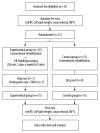Game-Based Virtual Reality Canoe Paddling Training to Improve Postural Balance and Upper Extremity Function: A Preliminary Randomized Controlled Study of 30 Patients with Subacute Stroke
- PMID: 29702630
- PMCID: PMC5944399
- DOI: 10.12659/MSM.906451
Game-Based Virtual Reality Canoe Paddling Training to Improve Postural Balance and Upper Extremity Function: A Preliminary Randomized Controlled Study of 30 Patients with Subacute Stroke
Abstract
BACKGROUND Virtual reality (VR) training with motion-controlled console games can be incorporated into stroke rehabilitation programs. The use of a variety of gaming software can provide the patient with an opportunity to perform activities that are exciting, entertaining, and that may not be feasible in clinical environments. The aim of this preliminary randomized controlled study was to investigate the effects of game-based VR canoe paddling training, when combined with conventional physical rehabilitation programs, on postural balance and upper extremity function in 30 patients with subacute stroke. MATERIAL AND METHODS Thirty patients, who were within six months following the diagnosis of stroke, were randomly allocated to either the experimental group (n=15) or the control group (n=15). All participants participated in a conventional rehabilitation program. Also, the experimental group (n=15) performed the VR canoe paddling training for 30 minutes each day, three times per week, for five weeks. After five weeks, outcomes of changes in postural balance and upper extremity function were evaluated and compared between the two groups. RESULTS At five weeks, postural balance and upper extremity function showed significant improvements in both patients groups when compared with the baseline measurements (p<0.05). However, postural balance and upper extremity function were significantly improved in the experimental group when compared with the control group (p<0.05). CONCLUSIONS Game-based VR canoe paddling training is an effective rehabilitation therapy that enhances postural balance and upper extremity function in patients with subacute stroke when combined with conventional physical rehabilitation programs.
Figures
References
-
- Dogru Huzmeli E, Yildirim SA, Kilinc M. Effect of sensory training of the posterior thigh on trunk control and upper extremity functions in stroke patients. Neurol Sci. 2017;38:651–57. - PubMed
-
- Portnoy S, Reif S, Mendelboim T, Rand D. Postural control of individuals with chronic stroke compared to healthy participants: TUG, FRT and center of pressure movement. Eur J Phys Rehabil Med. 2017 [Epub ahead of print] - PubMed
-
- Batchelor FA, Mackintosh SF, Said CM, Hill KD. Falls after stroke. Int J Stroke. 2012;7:482–90. - PubMed
Publication types
MeSH terms
LinkOut - more resources
Full Text Sources
Other Literature Sources
Medical



